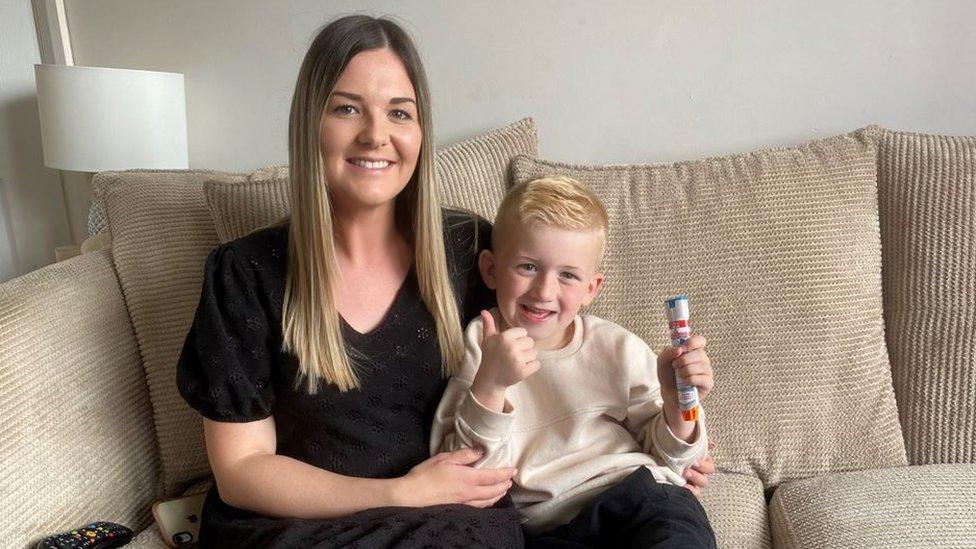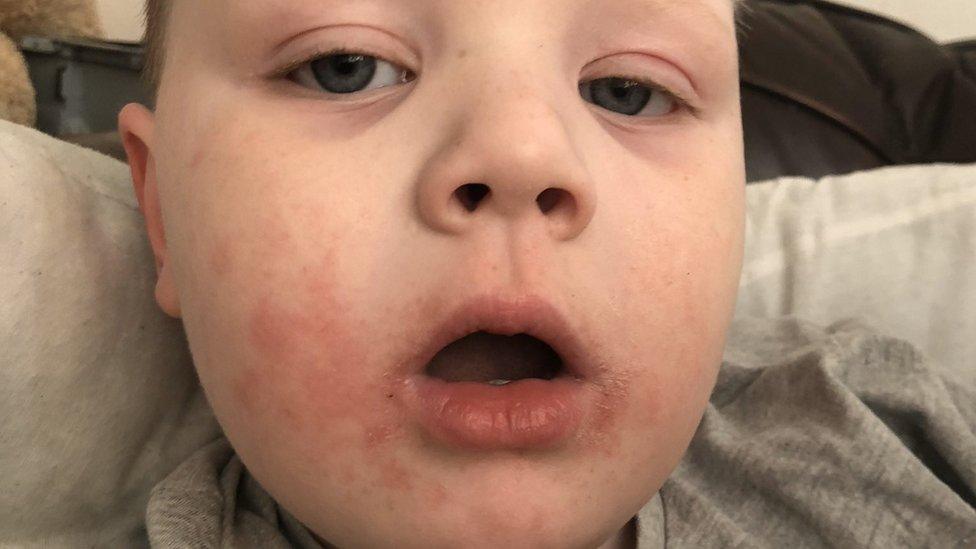Anaphylaxis: Mum teaches football camp about severe allergies
- Published

Rachel Williams was not sure her son would be safe at a football club, so has pushed for training on allergies
A woman concerned by her son's allergies has changed the way a football camp approaches allergies.
Rachel Williams' son Jacob, six, has a severe nut allergy and before he headed off to a football camp, she wanted to make sure he was in safe hands.
After speaking to the Swansea City AFC Foundation, who operate local football camps, they invited her to show staff how to administer adrenaline.
She said it could save children's lives.
According to the Anaphylaxis Campaign charity, 5% of children have allergies.
Anaphylaxis is a severe and potentially life-threatening reaction to a trigger, such as an allergy, according to the NHS, external.
Symptoms include feeling light-headed, breathing difficulties, clammy skin, confusion and loss of consciousness.
Jacob is like any other six-year-old, except he could die if those around him do not know how to administer treatment if he needs it.
He is allergic to peanuts, tree nuts, dust, cats and has hay fever. Ms Williams said she did not want Jacob to miss out, but was nervous about sending him to a holiday camp.
Ms Williams, from Swansea, contacted the team running the Swansea City boot camp, advising them of free allergy awareness training online.

Staff at Swansea City AFC Foundation football camps have all been trained how to administer treatment for people who suffering from anaphylaxis
However, it prompted the club to take stronger measures and they asked her to come in and speak about her family's experience and how to administer adrenaline auto-injectors.
Adrenaline auto-injectors are prescribed to people with severe allergies who are at risk of a serious reaction, or anaphylaxis.
They work by providing a dose of adrenaline into the bloodstream, and are often injected into the thigh.
In the UK people will be prescribed either an Epi-pen, Jext or Emerade injector.
"They asked me a little bit about Jake's story so I told them about how we knew about his allergy," Ms Williams said.
"I told them about different symptoms we've come across along the years because we haven't had to use Epi-pens but we have had to use medication."

Tom Williams says it is important football camps are "safe and inclusive" environments
Tom Williams, head of programmes for the Swansea City AFC Foundation, said: "It's really important to us to offer a safe and inclusive environment so parents can leave their children with us and feel confident we can deal with any kind of medical issues that can arise.
"The training really did put a lot of staff at ease, that administering the auto injector pen isn't as big a thing as they might have feared.
"It's a relatively straightforward thing to do and it can save a life."
'Everyone should know how to save a life'
Sarah Baker, campaign manager at Anaphylaxis Campaign, said: "I think there's a huge lack of awareness on how to use adrenaline auto-injectors.
"Training in knowing how they work and what to do with them is really important for everybody, because you could be walking down the street, you could be in the park, you may be with a family member or a friend who has anaphylaxis and is carrying an adrenaline auto injector.
"I would say absolutely everyone should have an awareness of what anaphylaxis is, how to recognise it, and then in turn know how to use the different types of adrenaline auto-injector on the market."
'If he touches that birthday cake, he'll die'
For Ms Williams, being able to share her knowledge has been a weight lifted off her shoulders.
She said: "It's so nice to know that they were willing to take it seriously. I'm really grateful that they were willing to do that.
"It's definitely going to help in future when Jacob goes to more days like that.
"It feels good to know that they've done it."

What to do if someone has anaphylaxis?
Anaphylaxis is a medical emergency. It can be very serious if not treated quickly.
If someone has symptoms of anaphylaxis, the NHS recommends:
Use an adrenaline auto-injector if the person has one - but make sure you know how to use it correctly first
Call an ambulance immediately and alert them the person has anaphylaxis
Remove any trigger if possible - for example, carefully remove any stinger stuck in the skin
Lie the person down and raise their legs - unless they're having breathing difficulties and need to sit up to help them breathe. If they're pregnant, lie them down on their left side.
Give another injection after five minutes if the symptoms do not improve and a second auto-injector is available
Source: NHS


FIGHT FOR YOUR RIGHTS: X-Ray returns and they've got your back
SPOTLIGHT ON THE NHS: Is Covid masking a bigger problem with our health service?

- Published12 February 2020

- Published8 March 2019

- Published23 August 2017

- Published13 September 2019
